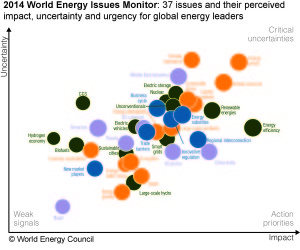Johannesburg, South Africa, 18 February 2014 – High energy price volatility has for the first time replaced global climate framework as the number-one critical uncertainty driving the world energy agenda, according to the 2014 World Energy Issues Monitor, released today by the World Energy Council (WEC).
Global climate framework uncertainty, while still is a key uncertainty, is now perceived by energy leaders to have less impact than in the previous three years of the study. Meanwhile, carbon capture, utilisation and storage (CCUS) continues to be viewed as a technology with only a limited impact on the energy sector, continuing the clear trend over the past three years.
Christoph Frei, WEC Secretary General, comments at the launch of the report at the Africa Energy Indaba:
“The fact that both climate framework and CCUS are perceived to be issues of less impact is bad news not only in terms of emissions mitigation, but also for the development of robust and resilient energy infrastructure. Our energy systems are in a state of massive expansion and transition, and the signals we see today provide clear evidence of the urgent need for more robust, coherent, long-term frameworks within which to plan and implement future investment.”
Energy price volatility goes beyond merely oil and gas prices and their regional differentials. It is also being influenced by the coal-to-gas substitution in the US; the increasing use of coal in Europe, which has driven up emissions; the collapse of solar module prices; and Australia re-directing its interest from North America to Asia while North American infrastructure companies are signing more deals with Asian customers.
The WEC study further finds that energy leaders are increasingly concerned about the sector’s ability to access the capital markets for funds towards energy infrastructure, when set against a continued recessionary backdrop.
Meanwhile, renewable energy and energy efficiency continue to keep energy leaders busy, with growth shifting from Europe and North America to the Middle East where demand is rapidly rising. Large hydropower is back on the agenda with significant unrealised potential in central Africa, Latin America, Russia, and Canada.
The 2014 World Energy Issues Monitor is the culmination of a six-month study capturing the views of over 800 energy leaders including ministers, chief executives and the heads of the WEC’s national members committees covering 84 countries. The report, which highlights strong regional variations, looks at the global energy agenda and analyses the trends and outlook in six world regions plus 24 countries.
In Africa, the top critical uncertainties are climate framework, high energy prices, and commodity prices. As a change from last year, national governments and regional institutions are taking actions in energy efficiency and regional interconnection, while investment cooperation with China and India is viewed with increasing importance.
Bonang Mohale, WEC Vice-Chair for Africa, comments:
“Our African survey finds that, in contrast with the global findings, climate framework has become an even more critical issue. Africa is dramatically vulnerable to climate change, and Africans are becoming more aware that climate change is an urgent and real issue rather than something that only countries with large emissions should worry about.”
Electricity supply remains a critical concern in Africa, with growing demand, lack of required investment, and increasing power shortages across the continent. Renewable energy remains a high-priority issue.
Marie-José Nadeau, Chair of WEC, concludes:
“This analysis shows us that the energy sector is reacting to short-term price signals while long-term signals are still absent. As the gap between energy access, energy security and energy sustainability widens, the financial investments and technical efforts required to deliver simultaneously secure, affordable and environmentally sustainable energy will increase significantly. The World Energy Council therefore urges the energy community to work on long-term frameworks, as they are key to our ability to reach our goals.”
The study finds that in addition to energy prices, the top regional critical uncertainties are:
-
Africa: climate framework, commodity prices
-
Asia: renewable energy
-
Europe: global recession
-
Latin America & Caribbean: commodity prices, capital markets
-
Middle East & North Africa: energy efficiency, renewable energy
-
North America: nuclear energy, capital markets
Download the 2014 World Energy Issues Monitor on: www.worldenergy.org/publications
Media enquiries: Monique Tsang
World Energy Issues Monitor
The World Energy Issues Monitor is the WEC’s annual assessment of the issues impacting the global and regional energy sector based on the views of the WEC’s energy leadership community. It identifies the key uncertainties while highlighting the areas where action is most required to enable the sustainable supply and use of energy.
The 2014 report includes assessment of six world regions and 24 countries: Bulgaria, Colombia, Estonia, France, Germany, India, Indonesia, Italy, Japan, Latvia, Lebanon, Lithuania, Mexico, New Zealand, Nigeria, Poland, Portugal, Romania, Serbia, South Africa, Spain, Switzerland, Turkey, and the United Kingdom.
The report highlights 37 issues and their perceived impact, uncertainty, and urgency for global energy leaders and experts. The graphic below illustrates these issues.






